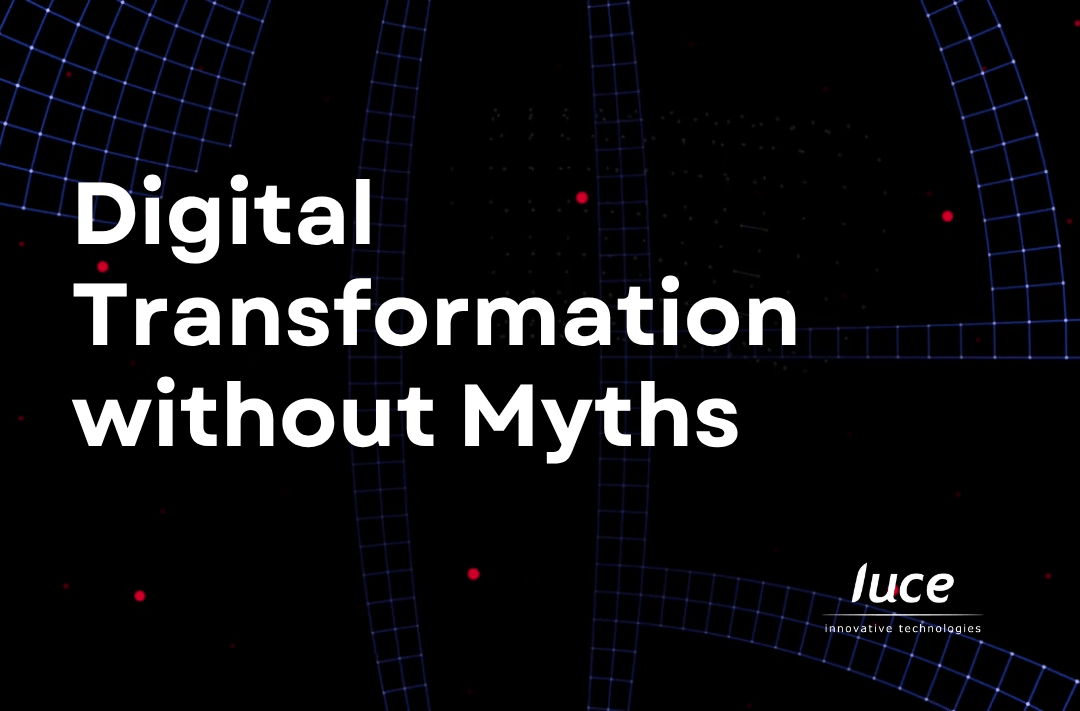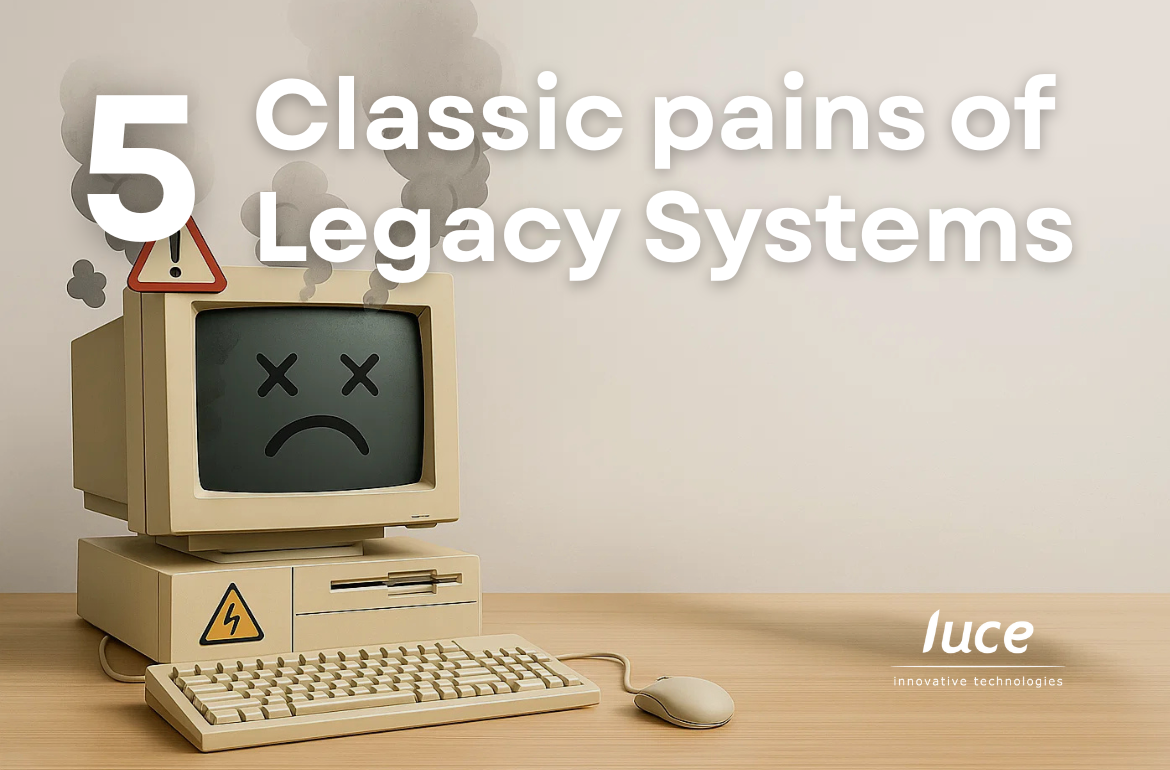
Digital Transformation Without Myths: Key Technologies and Benefits
Digital transformation represents an unavoidable strategic imperative for companies seeking not only to survive but to thrive in their industry.
This process goes beyond the mere adoption of new technologies; it involves a fundamental reconfiguration of traditional business methods by integrating digital approaches into every facet of operations to redefine value delivery to the customer. A holistic approach encompassing technology, people, processes, and culture is essential to avoid common pitfalls and reap long-term benefits such as greater efficiency, improved decision-making, and sustained competitive advantage.
Why is digital transformation crucial for large companies?
-
Sustained Competitive Advantage: In a market where technological disruption is constant, companies that adapt quickly gain a significant edge. Digital transformation enables greater efficiency, data-driven decision-making, and agile responsiveness to market changes.
-
Enhanced Efficiency and Productivity: Automating repetitive tasks and optimizing processes frees up valuable time for teams to focus on higher-value strategic activities.
-
Data-Driven Decision-Making: Digital tools facilitate the collection and analysis of large volumes of real-time data, offering valuable insights into customer behavior, market trends, and operational performance.
-
Superior Customer Experience: Enables the delivery of personalized, seamless, and omnichannel services, which not only increases customer satisfaction but also fosters brand loyalty.
-
Agility and Flexibility: Digitally transformed companies can adapt more quickly to market shifts and changing customer needs.
-
New Revenue Opportunities: Opens paths for the creation of innovative digital products and services, as well as expansion into new markets.
-
Risk of Falling Behind: Companies that fail to innovate—especially digitally—face a high risk of being left behind in increasingly dynamic and competitive markets.
Strategic and Competitive Benefits of Digital Transformation
Adopting digital transformation brings a range of strategic and competitive benefits that are fundamental to business sustainability and growth.
First, there is a significant increase in efficiency and productivity through the automation of repetitive tasks and the optimization of internal processes. This frees up valuable time for employees to focus on higher-value strategic activities.
Second, digital transformation drives superior, data-driven decision-making. Digital tools facilitate the collection and analysis of large volumes of real-time information, providing valuable insights into customer behavior, market trends, and operational performance. This analytical capability allows companies to act in a more informed and strategic manner.
A third benefit is the substantial improvement in customer experience. Digital transformation enables the delivery of personalized, seamless, and omnichannel services through multiple touchpoints, such as websites, mobile apps, and social media. This not only increases customer satisfaction but also fosters brand loyalty.
Additionally, companies become inherently more agile and flexible, capable of adapting quickly to market changes and shifting customer needs. Operational cost reduction is another tangible benefit, resulting from process optimization, lower maintenance and logistics expenses, and more efficient allocation of human resources.
Digital transformation also opens new revenue streams and business opportunities by enabling the creation of innovative digital products and services and expansion into new markets. It fosters an internal culture of innovation, encouraging experimentation and the development of new ideas. Furthermore, it enhances collaboration and teamwork through the use of digital tools and boosts operational scalability through cloud-based solutions. Finally, it strengthens cybersecurity and data protection—critical aspects in today’s digital environment.
These benefits are not isolated elements; they work together, creating a comprehensive and lasting competitive advantage. For instance, better data collection leads to more informed decisions, which in turn drive innovation and enhance customer experience. This synergy can unlock new revenue streams and increase market penetration, ultimately leading to a superior competitive position. Cost reduction and increased efficiency free up resources that can be reinvested into future innovations, creating a virtuous cycle. Therefore, digital transformation is not just a solution to current challenges but a strategy to build a resilient, adaptable, and future-ready company—one capable of continuously innovating and outperforming competitors in a constantly evolving market. This holistic impact makes it a necessity, not a choice.
Key Technologies
Digital transformation is driven by a set of advanced technologies that serve as essential enablers, allowing companies to reinvent themselves and compete effectively.
Artificial Intelligence (AI) and Machine Learning
AI enables organizations to automate complex tasks, extract valuArtificial Intelligence (AI) and Machine Learningable insights from large volumes of data, and deliver highly personalized customer experiences. Its impact is seen in chatbots, predictive maintenance, and personalized recommendations.
Nearly 70% of corporations view it as a competitive advantage, but implementation requires addressing ethical concerns and employee training.
Big Data and Advanced Analytics
The collection and analysis of large data sets are fundamental to digital transformation. Big Data tools help identify trends, optimize operational efficiency, and make faster, more informed decisions about consumer behavior and performance. However, data quality and governance are crucial to avoiding failure in the transformation journey.
Cloud Computing
Cloud computing is essential to digital transformation, enabling companies to store and process data efficiently. It offers flexibility, rapid resource scalability, cost reduction, improved collaboration, and increased business agility.
Moderns ERP and Database Technologies
Modern ERP systems, especially those cloud-based and AI-powered, serve as the central “brain” of digital transformation. They integrate key processes such as finance, HR, and supply chain management, and are scalable and adaptable to manage and analyze large data volumes, delivering operational intelligence.
Internet of Things (IoT) and Automation
IoT connects smart devices to create more efficient environments and allow real-time monitoring of products and services. Automation, often powered by AI, optimizes processes, reduces costs, and frees human resources for higher-value strategic tasks.
Cibersecurity
As more data and systems move online, cybersecurity becomes essential to protect information and maintain customer trust. It is a strategic investment that not only provides protection but also enables innovation and agility. Therefore, it must be integrated from the outset of any digital strategy.
Digital transformation is a complex but unavoidable journey for any organization aiming for long-term relevance and growth. It is not merely a technological upgrade, but a deep strategic and cultural redefinition, driven by the integration of digital technologies to deliver customer value and optimize operations.
To modernize your company without failing, remember that success relies on a clear understanding of its many facets and the implementation of strategies that mitigate inherent risks. Prioritize a clear vision, committed leadership, an adaptable culture, and smart investment in both technology and, above all, in your human talent. By approaching this journey with a methodical and people-centered focus, your company will be well-positioned to thrive in the digital era.
If your company needs to transform its business model and secure its digital future, don’t hesitate to contact us.
Luce IT, your trusted technology innovation company
The Luce story is one of challenge and non-conformity, always solving value challenges using technology and data to accelerate digital transformation in society through our clients.
We have a unique way of doing consulting and projects within a collegial environment creating “Flow” between learning, innovation and proactive project execution.
At Luce we will be the best by offering multidisciplinary technological knowledge, through our chapters , generating value in each iteration with our clients, delivering quality and offering capacity and scalability so they can grow with us.
>> The voice of our customers – Rated 9 in 2024
>> Master Plan 2025: Winning the game




